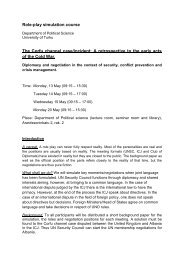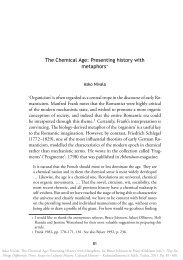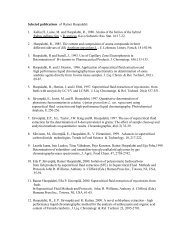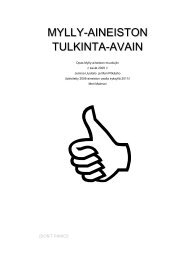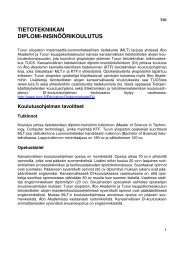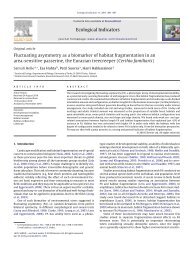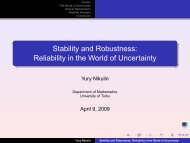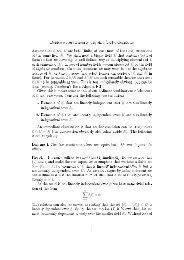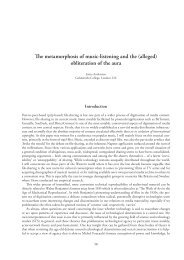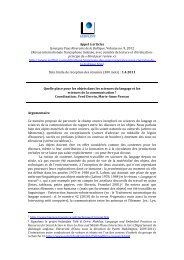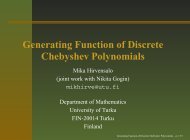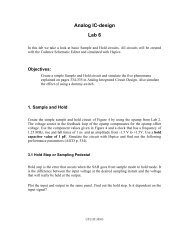The Chemical Age: Presenting history with metaphors∗
The Chemical Age: Presenting history with metaphors∗
The Chemical Age: Presenting history with metaphors∗
Create successful ePaper yourself
Turn your PDF publications into a flip-book with our unique Google optimized e-Paper software.
<strong>The</strong> <strong>Chemical</strong> <strong>Age</strong>developed for the open, unpredictable future that could bring completelynew and surprising incidents. 51Schlegel’s metaphor of the present projects as the seeds of the future indicatesthat he never completely abandoned organic imagery. Yet, becauseof the chemical nature of wit behind fragments, he associated fragmentaritymore usually <strong>with</strong> chemistry. 52 This already emerged in my firstcitation: Schlegel emphasized that modern <strong>history</strong> is chemical, not organic.In other words, the turbulent transitional phase after the year 1789was not stable organic growth. It consisted of sudden man-made interruptions,which could lead to unpredictable reactions and to a completelynew era of mankind. According to Schlegel’s experience, the present hadcut its roots to the past and organic metaphors had to give way to unforeseeablereactions in a test tube. Schlegel explicitly compared the socialexperiments of the French Revolutionary Government <strong>with</strong> experimentsin a laboratory. 53To conceive of <strong>history</strong> as a striving for an open future signified a changein the notion of <strong>history</strong>. History was no more conceived simply as anorganic or teleological process. 54 That is to say, it was not consideredaccording to a purpose (telos) that would be outside of <strong>history</strong>. For Schlegel,the essential principle of <strong>history</strong> is its own immanent movement towardsthe as yet undetermined future. <strong>The</strong> tendencies that were bubbling in thetest tube of his contemporary <strong>history</strong> could lead <strong>history</strong> in a completelynew direction, or on the other hand remain only as unfulfilled tendencies.In fact, the metaphor of seed that was occasionally used by the Romantics,also contested the finalism 55 of organic thinking. Only a small number51 Koselleck [1979] 2004, p. 242.52 See for example KFSA II, p. 148. No. 9. Although Schlegel made a distinction betweenchemical wit and organic genius, he also characterized wit to be fragmentary ingenuity(Genialität). Prima facie this seems to be contradictory, but the idea behind this wasthat holistic organic thought is impossible for limited human beings, whereuponingenuity can only appear in a fragmented chemical manner. KFSA II, p. 243. No.412.53 KFSA II, p. 248. No. 426.54 On the teleological implications of the organicist models in <strong>history</strong> writing cf. White1973, p. 16.55 ‘Finalism’ is the philosophical view that there are final causes in nature. In this case itmeans that organisms can be explained in terms of their end or purpose. <strong>The</strong> metaphorAsko Nivala: <strong>The</strong> <strong>Chemical</strong> <strong>Age</strong>: <strong>Presenting</strong> History <strong>with</strong> Metaphors. In: Bruce Johnson & Harri Kiiskinen (eds.): <strong>The</strong>y DoThings Differently <strong>The</strong>re. Essays on Cultural History. Cultural History – Kulttuurihistoria 9. k&h, Turku, 2011. Pp. 81–108.95




